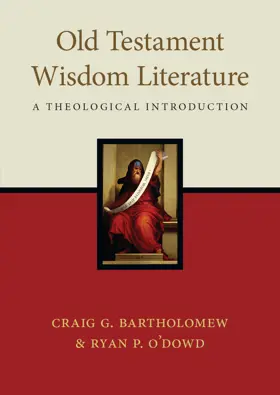

Old Testament Wisdom Literature: A Theological Introduction
Pages
336
Publisher
InterVarsity Press
Published
2018
ISBN-13
9780830852185
The books of Job, Proverbs, and Ecclesiastes are rooted in the order created by the one true God. Their steady gaze penetrates to the very nature of created reality and leads us toward peace and human flourishing. Craig Bartholomew and Ryan O'Dowd tune our ears to hear once again Lady Wisdom calling in the streets.
Old Testament Wisdom Literature provides an informed introduction to the Old Testament wisdom books Proverbs, Ecclesiastes and Job. Establishing the books in the context of ancient Near Eastern wisdom traditions and literature, the authors move beyond the scope of typical introductions to discuss the theological and hermeneutical implications of this literature.
Old Testament Wisdom Literature provides an informed introduction to the Old Testament wisdom books Proverbs, Ecclesiastes and Job. Establishing the books in the context of ancient Near Eastern wisdom traditions and literature, the authors move beyond the scope of typical introductions to discuss the theological and hermeneutical implications of this literature.
Reviews
Still looking for that perfect book on OT Wisdom, but this is probably the best yet as far as it's broad scope. The first three chapter are gold. They set the Wisdom in the OT within its broader context of the ANE and give a wonderful introduction to the importance of biblical poetry. Chapters 4-9 give two chapters each to Proverbs, Job and Ecclesiastes. The discussion of Proverbs was certainly worth reading, and so also the discussion in the following chapter where they hone in on Proverbs 31 a bit. Job was a bit more frustrating for me personally. They seemed to discount some plain readings of the text and then seem surprised when the text agrees with what they've already discounted. For example, they posit Elihu's place in a negative manner(anticlimax) and then seem surprised that he is not mentioned among the three friends who spoke wrongly of God. Along that same line, they would rather read that line as Job having spoken rightly 'unto' God rather than 'of' God, perhaps because they can't figure why Job would repent of what he has said of God. But these things are not exclusive of one. They also, after speaking negatively of allegorical approaches to the text(rightly so), seem to venture rather closely to that themselves in their reading of Job 28 where they find the three friends, Sodom and Eden in the mining language seemingly on the basis of one word(overturned). O liked Belchers(finding favour) treatment of Proverbs and Job better in his NSBT book, although I didn't care at all for his treatment of Ecclesiastes. Ecclesiastes was my favorite by far of the three book discussions in Bartholomew and O'Dowd. There was much rejoicing and I had felt I had a friend here. The first discussion of Ecclesiastes that agreed that enigma was the best approach to hebel while tying the word closely to the phrase 'grasping at wind' and so carries the idea of life being an enigma and 'elusive'. The last three chapters are simply wonderful. I was impressed by the way they handles Jesus as wisdom and learned from it although I believe there is more work to be done here. I was moved deeply by their broad view of wisdom for all of creation, their refutation of a sacred/secular distinction and the various ways they explicitly applied wisdom to all of life. The one thing I was left wanting and expecting of them was to explore more the ways wisdom is worked into the rest of the OT. They mentioned it, but didn't explore it. I am waiting to find a book that explores particularly Genesis 1-3 and 1 Kings(Solomon). Great book. Get it for sure if you are doing anything serious out of these books or just want to explore the concept of biblical wisdom. Get Belcher and get Goldsworthy's gospel and wisdom.
